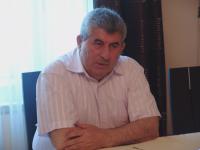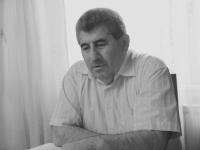Our Path to the Armenian Independence Was Through Suffering
Razmik Markosyan was born in a large family on December 21 1949, Yerevan. His father, Grigor and his mother, housewife Pepron, had three sons and three daughters. Razmik finished school named after writer Raffi but before that he had studied at another school where his classmates were Ashot Navasardyan and Razmik Zohrabyan who, subsequently, as Razmik himself became political prisoners and were among the first fighters for the independence of Armenia.
The growth of the national revival made a deep impression on Razmik Markosyan during the numerous demonstrations in Yerevan when it was the 50th anniversary commemoration of the Armenian Genocide in April 1965. Their family friend, historian Zaven Harutyunyan who worked at Matenadaran, the Institute of Ancient Manuscripts, played a vital role in the formation of young Razmik Markosyan’s outlook. His conversations with Razmik Markosyan and his parents about the independent Armenia prompted Razmik Markosyan to look for like-minded people who were found among his friends: his classmates and in the United National Party.
The United National Party was formed in 1966, which acted underground. It was an organization with its exact vertical structure, with its staff and with its clearly defined objective that was independence. Razmik Markosyan joined that very organization in 1969. In that year he was assigned to the Soviet Army where he served in the aircraft department. However, he was released from the army because of health issues.
Razmik Markosyan started working as a mechanic at the laboratory of aerodynamics at Yerevan State University. In 1972 he entered the Department of Cultural Studies at Yerevan Pedagogical University where he studied two years. Right after returning from the army Razmik Markosyan ran an underground preparatory and organizational work. Particularly, together with Razmik Zohrabyan, he prepared the creation of the underground printing press as well as the printing and distribution of leaflets.
In February 1974 Razmik Markosyan was arrested by the KGB for that activity. A leaflet was found the text of which, dedicated to the 1036 saints killed for their belief and homeland, was also prepared by Razmik Markosyan. Because of the lack of evidence, Razmik Markosyan was released after three days and got a warning from the Special Service according to the order of the Supreme Council of the USSR. However, Razmik Markosyan did not stop his activities and after a few months he was again arrested for his anti-Soviet propaganda, agitation and his participation in an anti-soviet organization. The interesting thing was that the KGB experts could not believe that it was possible to print leaflets of such a high quality in an underground printing house.
At the trial the Public prosecutor demanded a four-year imprisonment for Razmik Markosyan as there was only one witness stating that Razmik Markosyan had handed him leaflets. Razmik Markosyan concluded his last statement with an exclamation, “Long live the free and independent Armenia” After that, the judge who had been trying to drop two years from what was demanded by the prosecutor, decided to add two more years of exile to the years demanded.
In January 1975 Razmik Markosyan arrived by convoy in the camp ZHH-385/19, the village of Lesnoi, Mordovia. Here representatives of different political movements, various ages and nationalities were serving their sentences with him. After 5 months Markosyan was sent to hospital in the village of Barashevo ZHH-385/3-3 where he met and became friends with Ukrainian political prisoner Vasil Stus.
In October 1975 Markosyan along with three dozen young political prisoners of different nationalities as well as with four other Armenians were by special stage transferred to a new camp, ВС-389/37 in the Urals, village of Polovinka of the Perm Krai. On 30 October Markosyan and a few other prisoners went on hunger strike for the first time ever in that zone as a celebration of the Day of the Soviet Political Prisoner. On the eve of December 10, on the Day of Human Rights, Markosyan was unexpectedly transferred to the camp ВС-389/35 in the village.
After 10 days the Central returned him back to the 37th camp and in February 1975 back to Mordovia, camp ZHH-385/3-5 in the village of Barashevo where Ukrainian political prisoners Vyacheslav Chornovil and Vasil Dolishniy were also serving sentences.
The Armenian political prisoners went on hunger strike also on April 24, on the day of the commemoration of the massacred victims of the Genocide.
In 1975 Andrey Sakharov gave the name of Razmik Markosyan too among the prisoners of conscience who he was sharing the Nobel Prize with.
In February 1976 before the XXV Congress of the CPSU Markosyan had prepared a status of a political prisoner and stuck to it for 107 days before he was transferred to ZHH-385/19 in the village of Lesnoi. At the end of the next period spent in the cooler a friend from his party, Paruyr Hayrikyan, was sent to him for two days with the hope that the latter could persuade Razmik to stop the protest. Whereas, Hayrikyan stated that he supported the protest of his compatriot and demanded to be kept together in the same camp in the future.
After 30 days spent in the cooler Markosyan and the Ukrainian political prisoner Vyacheslav Chornovil were hospitalized at ZHH-385/3-3. They decided to improve the status of a political prisoner. That version became the basis approved by other prisoners of the Status of political prisoners. The prisoners of the camp № 19, Vyacheslav Chornovil, Vladimir Osipov, Michael Heifetz, Sergei Soldatov, Nikolai Budulak-Sharygin and others, also followed it starting a 100-day step-by-step hunger strike since April 1977. Later Paruyr Hayrikyan also joined them.
Since May 1976 Markosyan had constantly been under the pressure of the camp administration. Because of his refusal to be engaged in political activities and to march under the music every morning, he was deprived of the right to buying food, getting parcels and having visitors.
On 5 December 1976, on the Day of USSR Constitution, Razmik Markosyan and Paruyr Hayrikyan went on hunger strike sending statements to the Chairman of the Supreme Soviet of the USSR and the Armenian SSR in which they would insist on the legitimacy of the United National Party “the objective of which was to achieve the independence of Armenia in its historical boundaries by peaceful means and by holding a referendum in the Soviet part of Armenia”. 15 political prisoners of different nationalities supported their requirement.
In February 1977 Markosyan sent a statement to the Presidium of the Supreme Soviet of the USSR with the demand of implementing the Status of the political prisoner.
In April 1977 Markosyan moved to the Status of a political prisoner for the second time. His thirty-day stay in the cooler dramatically worsened his health. Vasil Chernovil announced in the cooler that he was stopping his one-day hunger strikes and he was starting a termless hunger strike with the demand of releasing Markosyan from the cooler. Other prisoners supported him. On that very day Markosyan was taken to the medical unit and after a few days he was sent to the hospital of the camp ZHH-385/3-3, in the village of Barashevo and later to Yerevan where he was kept in the KGB prison. There he announced a protest of a three-day hunger strike against the persecution of his party that was demanding the independence of Armenia. He was moved from Yerevan to Sverdlovsk by plane.
He was then sent to Perm by plane and then to the camp ВС-389/35 in the village of Central by train. Here he was again deprived of visits and he was put in solitary confinement because of his absenteeism.
In February 1978 Markosyan was sent on a two-year exile in the State Farm Kenbidaik of the Kurgaldjinski District of the Celinograd Region, Kazakhstan, where he worked on the construction. The famous Akmola camp for the wives of traitors was also here. He went on taking part in the actions of political prisoners and celebrating general, Armenian and Ukrainian actions of one-day hunger strikes.
At the end of April 1980, he was again arrested during the last days of his exile. His trip to Celinograd permitted by the Deputy Chief of Police was considered as an escape though that kind of violation of the exile regime suggested an administrative punishment such as fine and reprimand but not an imprisonment. In order to punish Markosyan by all means, his statement addressed to the Presidium of the Supreme Soviet of the USSR and to the Prosecutor General of the USSR written in 1977 – 1978 was found in the KGB and he was accused of “spreading false slanderous fabrications defaming the Soviet state and social system”. Oral statements on the occupation of Afghanistan, violation of human rights were also incriminated. Markosyan was sentenced to two years on the charge of “escape” in August 1980 and he was sentenced to three years imprisonment for the “slander” on the camp of strict regime. Three years in total. Committees for the protection of Markosyan were established in some European countries (France, Italy, Germany, Holland, Great Britain, Scotland).
On appeal the period was reduced to one year imprisonment. Markosyan, being a political prisoner served his sentence in the criminal camp in the village of New Uzen, Region of Mangilashkski, Kazakhstan. Markosyan considers that one year of imprisonment in the criminal camp as one of the hardest experiences that could fall on him during his detention.
During the imprisonment Markosyan was in 37 detention facilities, transfer prisons and camps, spent more than 200 days in coolers.
Markosyan was released in April 1981. After returning to Yerevan he spent two years under administrative supervision. He worked as a mechanic, process engineer, chairman of a cooperative.
In 1983 Markosyan entered Yerevan Polytechnic Institute and graduated in 1989.
In 1987 Markosyan and Paruyr Hayrikyan created Armenian Committee for the Defense of political prisoners. That Committee together with the Ukrainian initiative group for the defense of political prisoners joined the Transnational Committee for the Defense of political prisoners in Armenia, Georgia, Ukraine, and the Baltic Republics.
In 1987 Markosyan became one of the founders of the "Union of National Self-Determination" (OEF). He was the co-founder of the "Independent Army" and as a result he then became a member of the militias commanders of Syunik'''' during the war in Nagorno-Karabakh, where he was directly involved in fighting.
In 1998 – 2000 Markosyan was the chairman of the NGO of the Former Political Prisoners called 'Club 65'.
From 2000 to 2002 Markosyan was the Chairman of the Council of State for Religious Affairs in the Government of the Republic of Armenia and, according to the Decree of the President he was also a member of the Committee on Human Rights under the supervision of the President of the Republic of Armenia.
Since May 2002 Razmik Markosyan has been appointed as the Advisor to the Prime Minister for Religious Affairs and National Minorities according to the decree of the Prime Minister.
He is currently holding that position. In December 2006 Markosyan was awarded with the title of the “Honorary Doctor of the Yerevan State University of Architecture and Construction” for his contribution to the attainment of the independence of Armenia as well as for the 15th anniversary of the Independence of the Republic of Armenia. Markosyan is an academician at the International Academy of Spiritual Unity of the world. Razmik Markosyan is married.


